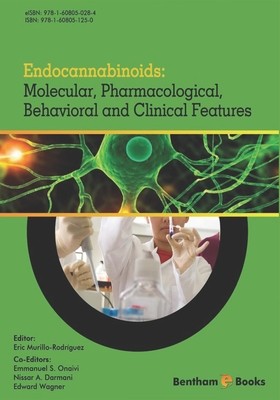
- We will send in 10–14 business days.
- Author: Eric Murillo Rodriguez
- Publisher: Bentham Science Publishers
- ISBN-10: 1608051250
- ISBN-13: 9781608051250
- Format: 17.8 x 25.4 x 1.5 cm, minkšti viršeliai
- Language: English
- SAVE -10% with code: EXTRA
Reviews
Description
The endocannabinoid system comprises at least two G-protein-coupled receptors (the cannabinoid CB1 and CB2 receptors) activated by marijuana's psychoactive principle ∆9-tetrahydrocannabinol (THC) and the endogenous ligands known as endocannabinoids. The apex of endocannabinoid research seems to have been reached with the clinical development, and also in some cases, the marketing, of synthetic or natural pharmaceuticals targeting this signalling system, which followed the understanding of the physiological and pathological role of endocannabinoids in several conditions, a role that was investigated first in rodent experimental models and then in humans. Endocannabinoids: Molecular, Pharmacological, Behavioral and Clinical Features is a monograph that presents interesting manuscripts selected by the editor on the subject. Chapters in this book include original research or reviews which report the relevance of the endocannabinoid system by describing the results of experimental evidence about the neurobiological role of the endocannabinoid system. The main topics include, but are not limited to: *The genetics of cannabinoid CB1 and CB2 receptors and their tissue distribution, their splicing variants and polymorphisms, and the possible implications of all this in determining different behaviours as well as various pathological conditions and the addiction to substances of abuse. *Pharmacological approaches describing the potential use in the central nervous system disorders of endocannabinoid-based drugs, such as cannabinoid receptor agonists and antagonists, inhibitors of endocannabinoid inactivation processes, and even plant cannabinoids other than THC and with a molecular mechanism of action. *The role of the endocannabinoid system in several neurological and neuropsychiatric conditions, such as epilepsy. The volume would be a great interest to neuropharmacologists, physiologists and biochemists who aim to learn about the endocannabinoid system in detail.
EXTRA 10 % discount with code: EXTRA
The promotion ends in 21d.02:51:21
The discount code is valid when purchasing from 10 €. Discounts do not stack.
- Author: Eric Murillo Rodriguez
- Publisher: Bentham Science Publishers
- ISBN-10: 1608051250
- ISBN-13: 9781608051250
- Format: 17.8 x 25.4 x 1.5 cm, minkšti viršeliai
- Language: English English
The endocannabinoid system comprises at least two G-protein-coupled receptors (the cannabinoid CB1 and CB2 receptors) activated by marijuana's psychoactive principle ∆9-tetrahydrocannabinol (THC) and the endogenous ligands known as endocannabinoids. The apex of endocannabinoid research seems to have been reached with the clinical development, and also in some cases, the marketing, of synthetic or natural pharmaceuticals targeting this signalling system, which followed the understanding of the physiological and pathological role of endocannabinoids in several conditions, a role that was investigated first in rodent experimental models and then in humans. Endocannabinoids: Molecular, Pharmacological, Behavioral and Clinical Features is a monograph that presents interesting manuscripts selected by the editor on the subject. Chapters in this book include original research or reviews which report the relevance of the endocannabinoid system by describing the results of experimental evidence about the neurobiological role of the endocannabinoid system. The main topics include, but are not limited to: *The genetics of cannabinoid CB1 and CB2 receptors and their tissue distribution, their splicing variants and polymorphisms, and the possible implications of all this in determining different behaviours as well as various pathological conditions and the addiction to substances of abuse. *Pharmacological approaches describing the potential use in the central nervous system disorders of endocannabinoid-based drugs, such as cannabinoid receptor agonists and antagonists, inhibitors of endocannabinoid inactivation processes, and even plant cannabinoids other than THC and with a molecular mechanism of action. *The role of the endocannabinoid system in several neurological and neuropsychiatric conditions, such as epilepsy. The volume would be a great interest to neuropharmacologists, physiologists and biochemists who aim to learn about the endocannabinoid system in detail.


Reviews